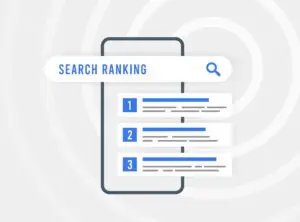
Is CTR an SEO Ranking Factor?

Is click-through rate (CTR) a ranking factor? It’s a valid question. We’re here to provide the answers and evidence.
Whether or not CTR contributes to ranking or not, make no mistake that this SEO reporting metric is incredibly valuable. Nobody wants to create content that gets no clicks, everything we do as an SEO agency boils down to traffic, visibility and conversions – CTR has a role to play in all of this.
Now, let’s get onto the debate!
What is organic click-through rate and is CTR a confirmed ranking factor?
Starting at its most basic level, a click is the act of a user seeing your result in the search engine results page (SERP) and clicking the link through to the page. So, the click-through rate is a metric that summarises how often a user clicks.
The sum that marketers use to measure click-through rate is the total number of impressions divided by the number of clicks.
On average, a click-through rate above 3% is considered a reasonable rate for SEO.
In SEO, a good click-through rate is a good indication of how relevant the content is to the search query. Relevancy and search intent are confirmed ranking factors, which is why so many SEOs ask the all-important question about CTR.
As far as Google’s guidelines go, click-through rate has not ever been confirmed as a ranking factor. However, Google HQ never really tells us what’s happening behind closed doors… which we already knew.
Therefore, we must rely on what the data tells us and evidence from industry experts to make an informed decision.
Today, search engines employ complex machine learning and artificial intelligence to work out the quality of a webpage. Google has had access to a wide variety of user experience metrics for quite some time now, but the Helpful Content Update suggests that indirect metrics (like backlinks and CTR) no longer play as big of a role as pre-rollout.
There are two arguments that we must explore here, but regardless of the outcome, optimise for user intent for better engagement and higher results.
Reasons why Google would reward a higher CTR
Google’s number one goal is to keep its users satisfied and retain them as search engine users. To do this, it must logically and effectively organise content in a way that makes finding valuable information easy.
Therefore, user behaviour could alter how Google prioritises ranking positions. If a page in position 10 gains an unexpectedly high number of clicks consistently, this indicates that the content satisfies the searcher’s needs.
So then, would rewarding this webpage with higher rankings help Google achieve its goal? Many SEOs believe that Google pays close attention to user behaviour to understand how valuable a piece of content is. If this is the case, a page generating a high volume of clicks would be perceived as relevant to the search query.
Google’s former Search Quality Chief, Udi Manber said:
“The ranking itself is affected by the click data. If we discover that, for a particular query, hypothetically, 80 percent of people click on Result No. 2 and only 10 percent click on Result No. 1, after a while, we figure Result 2 is probably the one people want. So we’ll switch it.”
It’s an interesting theory, backed by an insider. However, note where we said ‘former’ employee, which could signal some inaccuracy. Nevertheless, his statement somewhat makes sense. But this doesn’t address the question of whether a page in position 3 and onwards can ever make it up the ranks due to high click rates – this only addresses already top-ranking content.
Why does this not impact organic rankings?
Google states that 15% of daily searches are completely brand new. Optimising based on click-through rate would therefore be next to impossible.
On top of this, it’s worth considering the consistency of clicks. How often does a page receive consistently high clicks 24/7? What percentage of clicks would be considered high enough to knock another page off the top spot? What happens when an influx of clicks is temporary due to trend or seasonality?
Google would have to establish an incredibly advanced algorithm to detect the right content to put at the top of the result pages.
John Mueller of Google says: “If CTR were what drove search rankings, the results would be all clickbait. I don’t see that happening.“— (@JohnMu) November 4, 2021
Simply put, Google’s aim of placing diverse and relevant content in front of users suggests that a reliance on CTR would completely eliminate useful content, making the search experience unfair & unhelpful.
Ranking positions often are determined before they gain clicks
Going with the theory that CTR impacts rankings, let’s put this into perspective:
If studies show that pages in position 1 steal around 39.8% of clicks, then the highest ranking page could never be pushed off the top spot.
CTR appears to follow quality content rather than leading in rankings – it’s a consequence, not a signal.
Clicks can be manipulated
Google claims to be against any obvious signs of algorithm manipulation. From keyword stuffing to AI content generation, the complex system is wise to common tactics. For this reason, it’s fair to argue that if hundreds of clicks equated to high ranking positions, anyone with enough contacts could fight their way to position 1. In 2024, we saw three core updates in one year. This highlights Google’s commitment to really clamping down on spammy techniques and poor content.
We can only assume that whilst CTR wouldn’t directly impact rankings, it would act as a meaningful metric to allow Google to improve and validate the quality of search results.
Is CTR important for SEO?
Even if not a ranking factor, click-through rate is a very important metric to track. You should be optimising all of your content for traffic – the more clicks, the more traffic.
As any SEO will tell you, paying attention to the wider picture and optimising all aspects of your website is crucial for organic success. Improving your click-through rate is just one step in the right direction.
If your website has a high clicks to impression ratio, you can rest assured that you’re meeting the search intent and crafting useful content.

